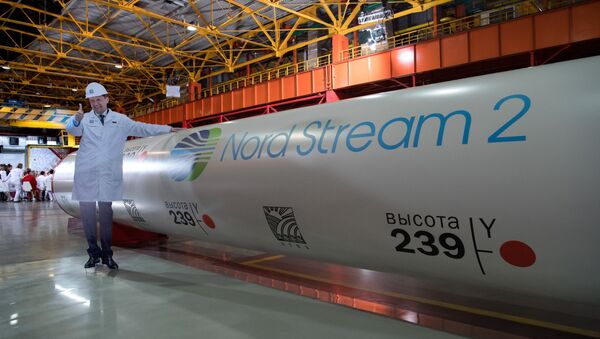The chief executive of the Austrian company OMV, involved in the Russian-European project Nord Stream 2, has defended the project. Rainer Seele has rejected US criticism, pointing out that it was Washington’s wish to sell American gas to Europe prompting this behaviour.
“If the US were to offer competitively priced liquefied natural gas (LNG) in Europe, they need not worry about the prospect of supply from Nord Stream 2 gas”, the top-manager said at the annual Handelsblatt energy conference, held by the German business daily.
Seele earlier lambasted the letters the diplomat reportedly sent to German companies involved in Nord Stream 2. While he stated that as a head of an Austrian entity he had not received any letters from the US ambassador, Seele still branded the message as “a completely unacceptable threat to German companies”.
READ MORE: Senior Official: German Gov't Has No Legal Premise to Interfere in Nord Stream 2
“It is an expression of the changed foreign policy of the US. Washington relies on confrontation rather than cooperation with its allies. I deeply regret that”, he said.
Grenell reportedly warned German participants of the Russian-European venture about “reputational costs and sanctions risks”, prompting backlash in Germany. While the country’s Foreign Ministry reportedly defined this as a provocation and advised companies no to react to the letters, Economy and Energy Minister Peter Altmaier told Handelsblatt that it would not be easy to intimidate Germany. He also stated that Berlin would not scrap the project saying “there is no legal basis for it”. According to Altmaier, the venture’s critics are targeting “the wrong whipping boy”.
Nord Stream 2 is a joint venture of Russia’s Gazprom and four European companies, apart from Austria’s OMV AG it includes: France’s Engie, UK-Dutch Royal Dutch Shell, Germany’s Uniper, and Wintershall.
The project is due to be wrapped up before the end of 2019 and envisages the construction of two gas pipelines that will run from Russia, through the Baltic Sea and to a hub in Germany, entirely bypassing Ukraine, which opposes the construction of the route along with Poland and the US.
Washington has consistently spoken out against the project, claiming that it will increase Europe’s dependence on Russian gas. President Putin, for his part, said that his American counterpart Donald Trump was pursuing the interests of US companies to sell more expensive LNG to Europe.


